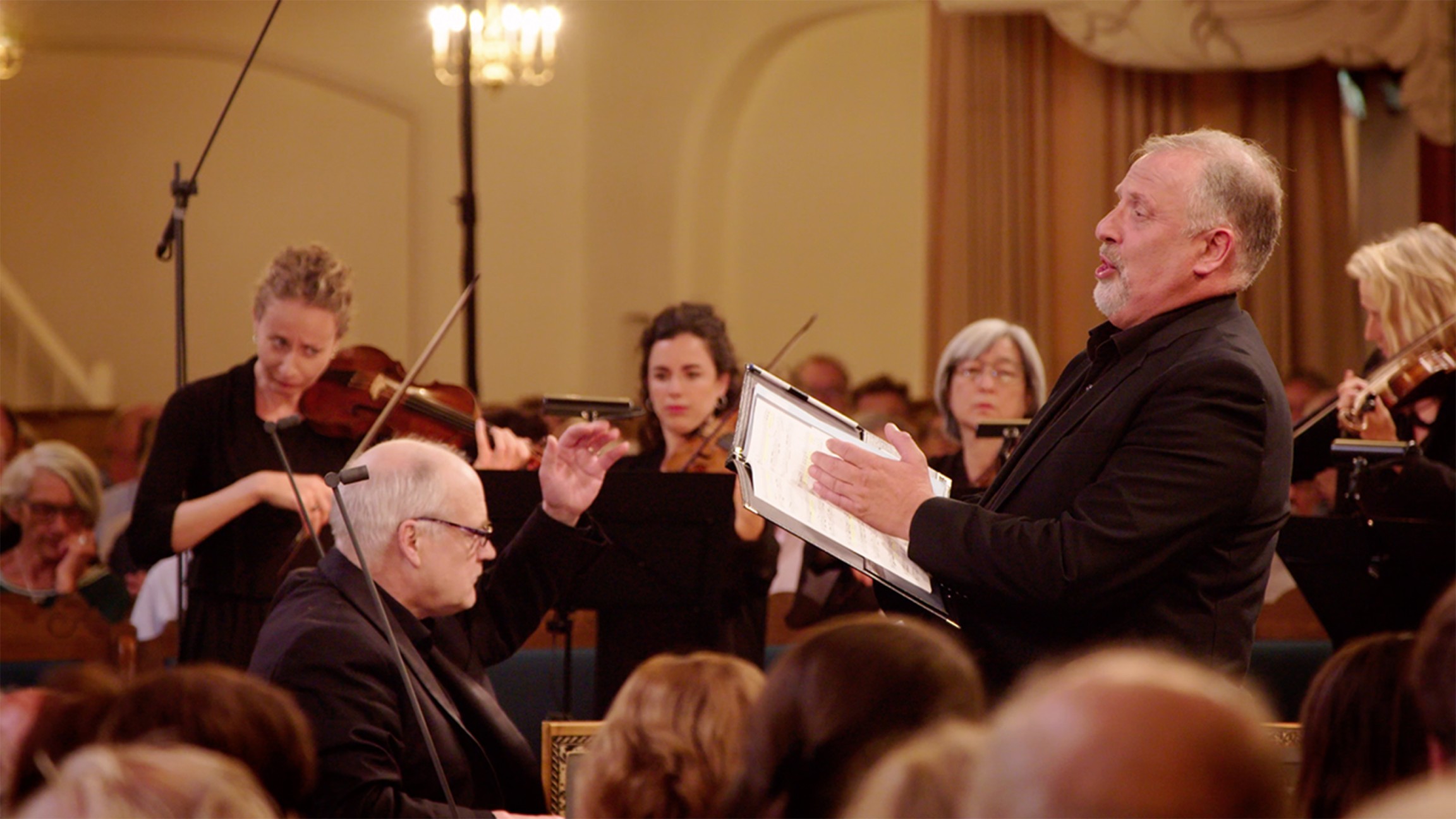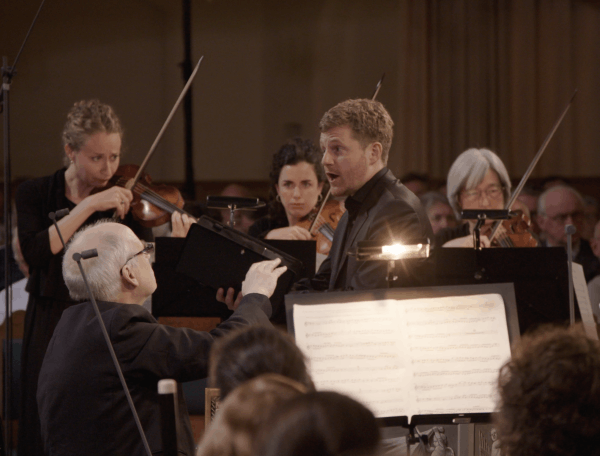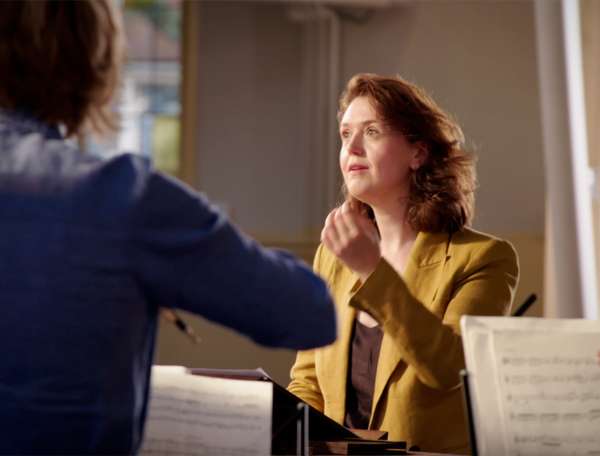

Was soll ich aus dir machen, Ephraim?
BWV 89 performed by the Netherlands Bach Society
conducted by John Butt
Walloon Church, Amsterdam
Behind the music
A divine problem
In this cantata, Bach puts God’s inner debate about justice and mercy into music
Bach's cantatas don't usually begin with a question. BWV 89 does, however, with a question asked by God himself in the Book of Hosea: "What shall I make of you, Ephraim?". In his exegesis Biblia parva philologico-exegetica, the seventeenth-century German theologian Johann Benedict Carpzov explains that such a question is called a contentio: a sort of debate with oneself, in this case about the choice between justice and mercy. Apart from the most staunch Bible readers, listeners will probably not immediately recognise the Old Testament names they hear: Ephraim, Admah and Zeboiim. Carpzov has an explanation for this as well: God wonders whether he should destroy the tribe of Ephraim, just like the cities of Admah and Zeboiim, which were destroyed alongside Sodom and Gomorrah.
Bach emphasises God’s inner debate by twice letting the questions he asks hang in the air unanswered. It’s as if God is still reflecting for a moment, chin in hand. Then, with ‘aber’, comes the redeeming answer: clemency rather than punishment. That, explains Carpzov, is precisely what this rather hermetic biblical passage with all those names is about: “This is the exuberant, beautiful and comforting speech that the Lord gives to His people, or rather to the penitent and the devout in the community”. The plaintive motifs in the two oboes sound like the people begging for mercy. And that hunting horn? There’s probably no specific idea behind it, as Bach added it at the last moment, when the aria had already been composed, possibly because a horn player suddenly became available.
The alto aria that follows is mainly about retribution, as well as referring to the destruction of Sodom. The accompaniment of only basso continuo provides a strict sound, in which the opening motif (linked to the text ‘Ein unbarmherziges Gerichte’) keeps recurring. That is further underlined in this performance by the multiple instrumentation for cello, bassoon, double bass and organ. At the end of the recitative for the soprano, the mood eventually changes, when mercy returns on the long-drawn-out word ‘wende’. The subsequent aria begins, just like the first aria, with a question. Here, however, there is no fear or uncertainty, but cheerful confidence. That is how – as you hear in the final chorus – you can conquer death, the devil, hell and sin.
Extra videos
Vocal texts
Original
1. Aria (B)
Was soll ich aus dir machen, Ephraim?
Soll ich dich schützen, Israel?
Soll ich nicht billig
ein Adama aus dir machen
und dich wie Zeboim zurichten?
Aber mein Herz ist anders Sinnes,
meine Barmherzigkeit ist zu brünstig.
2. Rezitativ (A)
Ja, freilich sollte Gott
ein Wort zum Urteil sprechen
und seines Namens Spott
an seinen Feinden rächen.
Unzählbar ist
die Rechnung deiner Sünden,
und hätte Gott auch gleich Geduld,
verwirft doch dein feindseliges Gemüte
die angebotne Güte
und drückt den Nächsten
um die Schuld;
so muß die Rache sich entzünden.
3. Aria (A)
Ein unbarmherziges Gerichte
wird über dich gewiß ergehn.
Die Rache fängt bei denen an,
die nicht Barmherzigkeit getan,
und machet sie wie Sodom ganz zunicht.
4. Rezitativ (S)
Wohlan! mein Herz legt Zorn,
Zank und Zwietracht hin;
es ist bereit, dem Nächsten zu vergeben.
Allein, wie schrecket mich mein sündenvolles Leben,
daß ich vor Gott in Schulden bin!
Doch Jesu Blut
macht diese Rechnung gut,
wenn ich zu ihm, als des Gesetzes Ende,
mich gläubig wende.
5. Aria (S)
Gerechter Gott, ach rechnest du?
so werde ich zum Heil der Seelen
die Tropfen Blut von Jesu zählen.
Ach rechne mir die Summe zu!
Ja weil sie niemand kann ergründen,
bedeckt sie meine Schuld und Sünden.
6. Choral
Mir mangelt zwar sehr viel,
doch, was ich haben will,
ist alles mir zugute
erlangt mit deinem Blute,
damit ich überwinde
Tod, Teufel, Höll und Sünde.
Libretto: unbekannt
Translation
1. Aria (B)
What am I to make of you, [kingdom of] Ephraim?
Shall I protect you [selfsame kingdom], Israel?
Shall I not fittingly
make of you an Admah
and destroy you like Zeboiim?
But my heart is otherwise minded;
my mercy is too fervent.
2. Recitative (A)
Yes, assuredly, God should
Declare a word of judgment
On his enemies
And avenge the mockery of his name.
[You, oh my conscience,] the reckoning of your sins is innumerable,
And even if God had like patience [for you as for Ephraim],
Your inimical disposition yet rejects
His offered goodness
And presses your neighbor for [repayment of] his debt;
Therefore [God’s] vengeance must ignite.
3. Aria (A)
A merciless judgment
Will certainly be enacted upon you.
[God’s] vengeance begins with those
Who have not done mercy,
And completely annihilates them, like Sodom.
4. Recitative (S)
Well, then! My heart lays aside anger, strife, and discord;
It is prepared to forgive its neighbor.
But, how my sin-filled life does terrify me,
Because I am in debts before God.
Yet Jesus’s blood
Makes good this reckoning [before God]
If, in faith, I turn to him
As the fulfillment of the law [of Moses].
5. Aria (S)
Righteous God, ah, do you reckon [my sins unto me]?
Then I will count the drops, for the salvation of souls,
Of Jesus’s [atoning] blood.
Ah! Reckon their sum unto me [for righteouness].
Yes, while nobody can fathom it [the sum],
It [the sum of the drops] covers my debt and sins.
6. Chorale
I lack much, indeed;
Yet everything that I wish to have
Is obtained to my benefit
With your blood,
Whereby I overcome
Death, devil, hell, and sin.
transl. © Daniel R. Melamed and Michael Marissen
For the annotated version of the text and translation, see here.
Credits
-
- Release date
- 13 November 2025
-
- Recording date
- 18 Sep 2024
-
- Location
- Walloon Church, Amsterdam
-
- Direction and harpsichord
- John Butt
-
- Soprano
- Carine Tinney
-
- Alto
- Alex Potter
-
- Tenor
- Julian Habermann
-
- Bass
- Matthew Brook
-
- Violin 1
- Cecilia Bernardini, Lucia Giraudo
-
- Violin 2
- Sayuri Yamagata, Annelies van der Vegt
-
- Viola
- Femke Huizinga
-
- Cello
- Albert Brüggen
-
- Double bass
- Robert Franenberg
-
- Oboe
- Rodrigo López Paz, Katharina Verhaar
-
- Bassoon
- Benny Aghassi
-
- Corno da caccia (hunting horn)
- Fabio Forgiarini
-
- Organ
- Daniel Seeger
-
- Director and editor
- Bas Wielenga
-
- Music recording
- Guido Tichelman, Pim van der Lee, Lilita Dunska
-
- Music edit and mix
- Guido Tichelman
-
- Camera
- Martin Struijf, Jesper Blok, Wesley Schipper, Tijmen Veerman, Dave Rypkema
-
- Lights
- Zen Bloot
-
- Grip
- Sander Radstaake, Jordi Kooij, Bram Galvin
-
- Assistant director
- Ferenc Soeteman
-
- Set technique
- Casper Heer, Dennis van Hoek
-
- Project manager nep
- Ron Vermeulen / Nik van Beelen
-
- Assistant music recording
- Marloes Biermans
-
- Producer concert
- Imke Deters, Stephan Esmeijer
-
- Producer film
- Lisanne Marlou de Kok
-
- This concert was realised with support from
- the Karin Strijbosch Fonds

